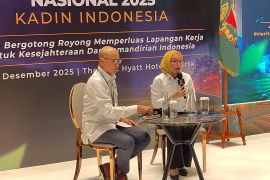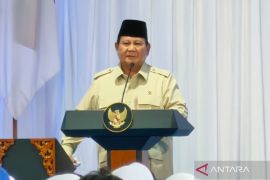Of course, inclusive collaboration between the government and private sector is needed because businesses cannot solve the problems aloneJakarta (ANTARA) - Digitalization will improve business competitiveness to face global economic uncertainty, as the world transitions to recovering from the COVID-19 pandemic, Head of the Indonesian Chamber of Commerce and Industry (KADIN) Arsjad Rasjid stated.
"When there is a challenge, there is a business opportunity. This opportunity can be seized in several ways, one of them being through automation or digitalization in increasing productivity," Rasjid remarked when contacted here Monday.
Companies will also need to continue to innovate in order to increase the added value of goods and services, which would further boost the operational cost efficiency in the longer term, he affirmed.
In addition to digitalization, he said, companies should adopt the values of Environmental, Social and Governance (ESG) in improving its values.
According to Rasjid, companies that implemented ESG initiatives were able to reap the benefits, including 15-30 percent higher price of goods and services in all sectors of business to consumers (B2C) and business to business (B2B), 50-percent faster sustainable growth of products, and an increase in return on capital.
Indonesia continues to face uncertainty in 2022 as the COVID-19 pandemic ligers on. Transmission of the virus has declined gradually during the year and various restrictions have been relaxed, thereby raising hopes of economic recovery, he elaborated.
The country's robust economic growth in the second quarter of 2022 is an indication that it has gradually recovered, with household consumption as the main contributor to the economic growth and gross domestic product (GDP).
However, increased geopolitical tensions due to the conflict between Russia and Ukraine have impacted the domestic economy.
Risjad said that concurrently, Indonesia and several other countries are facing multidimensional challenges in reviving the health sector during the post-pandemic era, strengthening national food resilience and energy security, as well as preserving the nation's financial stability.
Indonesia's business world should be able to adapt to the situation and optimize its businesses.
"Of course, inclusive collaboration between the government and private sector is needed because businesses cannot solve the problems alone," he emphasized.
An economist at the Centre for Strategic and International Studies (CSIS) Dandy Rafitrandi highlighted that the benefits of digitalization and automation encompassed an increase in business efficiency, wider access to the market, and improve quality and innovation of products.
"By using technology, allocation of raw materials and other resources can be planned and be more accurate," Rafitrandi noted.
The use of e-commerce, for instance, would not only open wider access to the market but also to necessary data that could be used in the businesses' decision-making process, he pointed out.
However, he underscored the need for companies to allocate big investment for digitalization, such as for its infrastructure and human resources.
These are crucial factors for the digitalization of businesses, Rafitrandi stated.
Related news: Vulnerable workers must be protected from economic uncertainty: Jokowi
Related news: Omicron stoking global economic uncertainty: Indrawati
Translator: Aji Cakti, Sri Haryati
Editor: Rahmad Nasution
Copyright © ANTARA 2022












